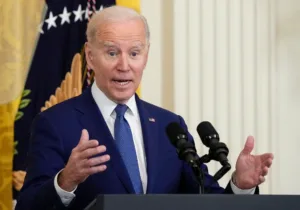Saudi Arabia is an indispensable partner in American grand strategy, not a “pariah,” as President Biden famously promised to make it. The relationship is as mutually beneficial as it is necessary: Saudi needs access to America’s advanced weapons and security guarantees while the US needs Saudi for its oil and geostrategic position contra Iran. Therefore, it is high time that the Biden Administration change course by moving forward with the pending US-Saudi defense treaty.
Nearing the end of President Biden’s first term, there has been plenty of talk regarding Saudi’s political shortcomings in conjunction with zero or less than zero constructive diplomatic action on America’s part. Due to the Biden Administration’s apparent policy of all but ignoring the Kingdom, Crown Prince Mohammad Bin Salman (MBS) has turned to China as its preferred superpower to work with. The Kingdom has proceeded to allow China to take precedence as a major tech partner, enabling Chinese tech companies to integrate with Saudi business instead of American ones. In October, Huawei, a Chinese tech giant that has faced heavy American sanctions for its interconnectedness with the Chinese government, opened a cloud data center in Riyadh to support Saudi government services while extending CCP influence in Arabia.
In addition, the Kingdom is considering a Chinese bid to build a nuclear power plant – a long held objective of Saudi. While the Kingdom continues to have substantial success in achieving its Vision 2030 goals, it has yet to make substantial progress in establishing the institutions necessary to halve domestic crude oil reliance by 2030. Given the energy needs of Saudi Arabia, there is no question that a singular nuclear power plant would have only a superficial impact on Saudi’s power situation. Hence, the bid by China to build a nuclear plant in the Kingdom is not a debt trap or threat to US prowess, but rather a test to see what MBS values more: the Kingdom’s relationship with the United States or his Vision 2030 agenda.
In essence, an Arabian Peninsula ridden with Chinese tech dominance and marked by affection towards the PRC in the form of civilian nuclear cooperation would all but relegate the US as Saudi’s primary benefactor and ally, much to the detriment of American grand strategy. Therefore, the Biden Administration should push forward with the Saudi defense treaty in a last-stitch effort to maintain political and economic predominance in the Kingdom. If it does not, Saudi has made it abundantly clear that it is ready to move forward with another (malintending) power.
The defense pact between Saudi and America, though beneficial for America’s relationship with Saudi, is not only about a single bilateral relationship. In the bigger picture, it is also about shoring-up cohesion among our allies in the region, primarily Israel and Arabian gulf states like Saudi. Pursuant to that end, the Saudi-US defense pact would also be a big step towards closer Saudi-Israeli relations, since both Middle Eastern nations would be indelibly brought together by their broader diplomatic arrangements. The United Arab Emirates, Saudi’s neighbor, has already normalized relations with Israel through the Abraham Accords and, if Saudi follows suit, President Biden will have an undeniably strong foreign policy achievement to bank on.
Furthermore, with the salience of the Palestinian conflict consistently declining in relevancy and concessions to Palestinians built into the Saudi-US defense treaty (such as a halt on Israeli annexation plans in the West Bank), there should be little doubt that the trend in Arab states normalizing relations with Israel will continue. As Israel makes its position clear, it is apparent that Saudi is ready to move on – without Palestine – in the name of its own national security. In fact, MBS has gone so far as to state in a recent interview with Fox News that “every day we get closer to normalization with Israel.” In other words, a Palestinian state is no longer a primary motivator as Saudi reconsiders its current geopolitical standing. Saudi would be foolish to continue prioritizing an increasingly weak Palestinian cause in light of the ever-present existential threat that Iran poses right across the Strait of Hormuz and MBS knows it.
The Biden Administration should not delay in signing this comprehensive defense deal with the Kingdom. Too much waiting will lead to dreams of such a deal dying out and Saudi quickly settling with China for a showy nuclear plant and an even more complicated situation in the Middle East as it’s refashioned into another American-Chinese proxy battleground.
President Biden, despite his realist reputation in foreign policy, seems to have been caught unaware that he cannot simultaneously press Saudi on injustices like the murder of Jamal Khashoggi and indiscriminate bombings in Yemen while also pushing Saudi to normalize with Israel. The United States has always and will always stand for democracy, yet we do not live in the world of even a decade ago and alliances with nations that do not share all our values must be made to keep China at bay. At the same time, Saudi cannot continue to flirt with China and expect the same relationship with America– it must choose between the democratic West and authoritarian China; no more can MBS play both sides in the new Cold War.
In short, there are existential questions at hand for both Israel and Saudi. If America is serious about its ironclad relationship with Israel and invaluable business and security relationship with Saudi, it must move forward with a deal to ensure the longevity and cohesion of its two strongest allies in the Middle East. With the US in need of better relations in the Arab world and Saudi in need of a powerful Western-aligned partner, it is time for America to stop dithering and retrench its Near Eastern position for the security of generations to come.







 Sponsor a student for Christianity & National Security 2024
Sponsor a student for Christianity & National Security 2024